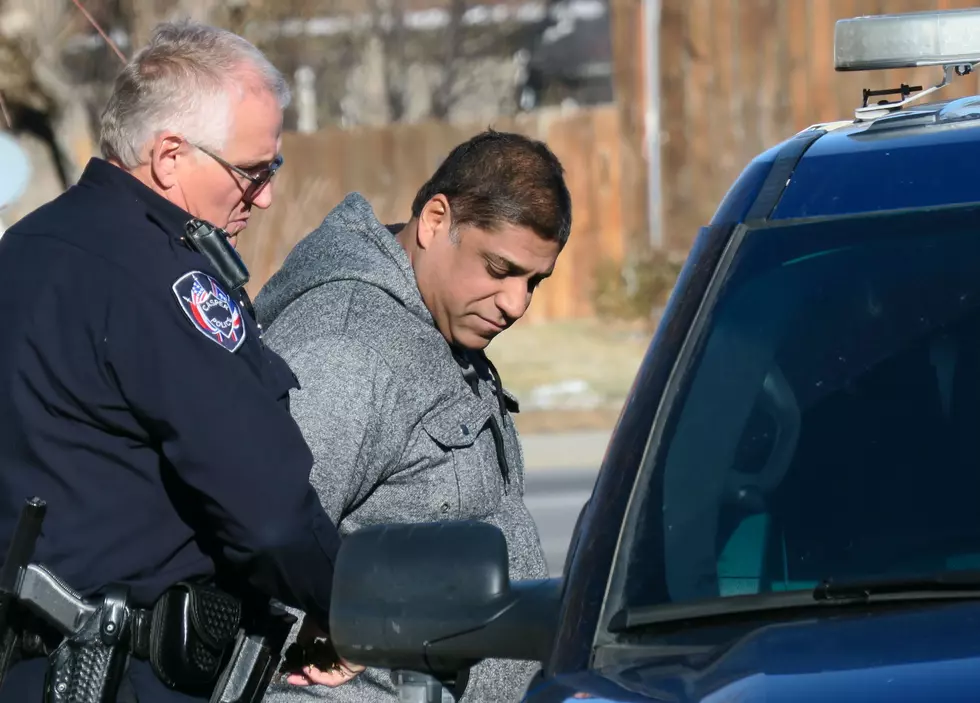
Former Casper Dr. Shakeel Kahn Sentenced to 25 Years for Prescription Drug Conspiracy
CHEYENNE -- Former Casper Dr. Shakeel Kahn was sentenced in federal court on Monday to 25 years imprisonment for his role in orchestrating a multi-state prescription drug conspiracy that cost a woman her life.
U.S. District Court Judge Alan Johnson handed down the sentence, which was the minimum Kahn could have received, plus three years probation after his release and an order to pay $5,000 to the family of the dead woman to cover funeral expenses.
Earlier Monday, Johnson sentenced Shakeel Kahn's brother, Nabeel Kahn, to 15 years and one month imprisonment for his role in the conspiracy to distribute oxycodone and other drugs, and for possessing a firearm during a federal drug-trafficking crime.
Both men were convicted May 24 after a month-long jury trial in Casper that followed a three-year investigation by the U.S. Drug Enforcement Administration and other law enforcement agencies, the boards of medicine in Arizona and Wyoming, and hundreds of court filings including superseding indictments. Three other defendants including Shakeel Kahn's wife, Lyn, and Paul Beland and Shawnna Thacker pleaded guilty before the trial began in April and testified on behalf of the prosecution.
The jury found Shakeel Kahn guilty of 22 counts including conspiracy to distribute oxycodone and other drugs resulting in death, possession of a firearm during a drug-trafficking crime, operating a continuing criminal enterprise, other drug crimes, money laundering, and unlawful use of a communication facility.
The drug distribution resulting in death and continuing criminal enterprise crimes are punishable by 20 years to life imprisonment, and the firearms crime is an automatic five-year prison sentence consecutive to any other punishment.
Johnson, in effect, applied the federal sentencing guidelines to bundle the two 20-year sentences to run concurrently along with the rest of the sentences, plus the mandatory five-year sentence for the firearms crime.
Kahn, 53, will be well into his 70s by the time he is released and he will never be able to practice medicine again, the judge said.
Monday afternoon, the Wyoming U.S. Attorney's Office asked Johnson to sentence Kahn to life imprisonment because of the callous disregard for people's lives and the greed that motivated him.
However, Kahn's attorney Beau Brindley said that the punishment for his client's crimes should not equal that of international drug dealers such as Joaquin "El Chapo" Guzman.
Johnson said Brindley had the better of the two arguments.
After the sentencing hearing, Brindley said he plans to appeal the case to the Denver-based 10th U.S. Circuit Court of Appeals on two factors.
The federal government suppressed evidence, as one example, Brindley said.
The other issue has to do with wording about the law, he said. Some federal courts have agreed with the understanding of the law that the government must prove someone has "prescribed medicine with no legitimate medical purpose" or "outside the scope of reasonable medical practice," he said.
However, some courts have ruled that the government must prove both, which is a greater burden, Brindley said.
He also complimented Johnson for not listening to the emotional appeal for the life sentence.
Assistant U.S. Attorney Stephanie Sprecher made that argument, but employed a battery of facts starting with a graph showing that Shakeel Kahn prescribed 2,170,275 pills in more than 31,000 prescriptions from 2011 until his arrest on Nov. 30, 2016.
That practice, all in cash, raked in nearly $3 million that netted three houses, a group of high-performance cars, firearms, and $1 million in cash found in one of his houses, she said.
Kahn's behavior was purposeful, criminal, dangerous and deadly, Sprecher said, the latter adverb referring to the overdose death of Arizona resident Jessica Burch.
He exploited vulnerable people who were in pain, and would take on patients and rapidly escalate the amounts in their prescription, as well as the costs, she said.
Kahn's crimes also stained the work of the vast majority of physicians, Sprecher added.
Most of Kahn's patients were unemployed and uninsured, and had to sell the pills they received to finance their habits, she's said.
Some of those patients and/or customers were able to find help for their addictions, while others are still struggling, Sprecher added.
Shakeel Kahn acted without remorse. During the trial, he blamed his wife for encouraging his illicit business, his family for pressuring to support Nabeel, and patients who lied to and manipulated him, she said. "He has a dogged sense of self-entitlement."
So she asked for a life sentence.
Even though he won't be able to practice medicine again, anything less will allow him to manipulate others in the future, Sprecher told the judge.
During his incarceration before the trial, he repeatedly violated court orders to not contact witnesses and even sent two recently released inmates at the Natrona County jail to visit Lyn Kahn at her house shortly before she was scheduled to testify, she added.
"This is a man who is a danger to society," Sprecher said.
During his defense of Kahn, Brindley said some witnesses lied under oath but were able to convince jurors to convict him.
Life imprisonment is the most serious a punishment the federal government can levy, Brindley said.
He is currently representing a lieutenant in Guzman's drug cartel who shipped hundreds of kilograms of cocaine to the United States, yet that client was sentenced to 28 years imprisonment, he said. Guzman, with a record of murdering people, was sentenced to life imprisonment, he added.
"Life is a sentence for people who willfully kill," Brindley said. "Shakeel Kahn was willfully reckless."
Unlike Guzman's cartel, Kahn did not intend for anyone to die, he added.
Brindley also said Kahn's patients bear some responsibility for their addictions, such as witness Anthony Vargas who testified he didn't get help for Jessica Burch when she was passed out.
"Do not give my client a life sentence," he concluded.
Kahn declined to speak during Monday's hearing.
Sprecher responded that there is a difference between Kahn and the likes of Guzman, who doesn't care who gets killed.
On the other hand, Kahn had a position of trust, she said.
Johnson said Brindley had the better argument, but added that the case was loaded with multiple tragedies.
Kahn worked hard to become a doctor, performed his residency in Casper, moved to western Arizona that was considered a medically underserved area, and opened his own practice as a family physician, the judge said.
But he transitioned into pain management, and from there the greed took over, Johnson continued.
Johnson recounted some of the evidence of the case, and decided on the 25-year sentence partially in order to ensure Kahn will not relapse, since he will never again have a license to practice medicine.
After the hearing, Wyoming U.S. Attorney Mark Klaassen said this was a significant case because of the amount of work his office did and that it aligned with the federal government's work to prosecute drug dealers.
Even though Johnson did not agree with the proposed life sentence, he's still pleased with the outcome, Klaassen said. "This one was particularly egregious ... the greed and no regard for the victims."
More From K2 Radio









